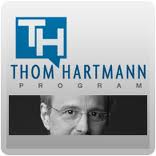 Back in February, workers at a Carrier manufacturing plant in Indianapolis were told that the factory, and their 1,400 jobs, were being moved to Mexico.
Back in February, workers at a Carrier manufacturing plant in Indianapolis were told that the factory, and their 1,400 jobs, were being moved to Mexico.
That story was front-and-center ahead of today's Indiana primary, and it shows how trade has become the big issue of the 2016 election.
On the left, Bernie Sanders took home two of his biggest wins in hard-hit rust belt regions like Michigan and Wisconsin by running on a platform that opposes the Transpacific Partnership and rightly points out that NAFTA, CAFTA, and Permanent Normal Trade Relations with China have helped destroy the middle class.
On the other side, Donald Trump has bucked the GOP party line on corporate managed trade deals and won over the blue-collar Republican base.
And like Sanders, Trump has brought in huge numbers of first-time voters and independents on a platform that is almost entirely focused on jobs and trade (even his racist immigrant language has a "jobs" subtext: "They're taking your jobs.").
His opponents have pointed to his stances on Planned Parenthood and transgender bathrooms as proof that Trump is too liberal to lead the Republican party, but he still continues to build support both from within the Republican party and from independents based on his trade/jobs stance.
If someone had told you a year ago that Donald Trump would be the Republican nominee, you probably would have thought it was some kind of bad joke.
It seemed much more likely that the nominee would be Jeb Bush or Koch Brother-darling Scott Walker - even Ted Cruz seemed likely based on the fact that he could readily capture the evangelical voting block.
Those candidates made sense because they could use the Republican time-tested formula of mixing fear about terrorists and welfare queens with fervent lip-service to God and the Bible.
But Donald Trump has a new and improved formula to drive voters to the polls.
Trump has pretty much embarrassed himself every time he's tried to pander to evangelicals, from quoting "Two Corinthians" at Liberty University to saying off the cuff that women should be punished for seeking abortions.
But compared to the viral sound-bite slogans that his supporters can shout, like "BUILD THAT WALL!" and "AMERICA FIRST", nothing else he's said has really mattered.
That's because they're not just outrageous slogans that uninformed racists can rally behind, they're slogans that reflect the fact that a lot of Americans feel screwed by our corporate managed trade deals that have destroyed the middle class and sent our factories overseas.
Or as Donald Trump put it in a recent campaign stop in Indiana: "We can't continue to allow China to rape our country."
What Trump said is undoubtedly crude, but it's how a lot of Americans across large parts of the country honestly feel.
This is really dangerous for the Democrats in November, because Trump's position on trade is something that both the far-right and the progressive left actually agree on.
Because of that, Democrats are risking losing their advantage in urban places like Baltimore, Detroit and St. Louis, and they're risking losing even more in smaller cities across the Rust Belt and the old textile-factory South, where closed down factories have left a void that crime and drugs have filled.
The simple fact is, if Hillary Clinton is the Democratic nominee, Trump may well walk away with the presidency, unless she seriously adjusts her position on trade.
Trump's already declared that he's going to start taking Bernie's messaging to run against Hillary Clinton, and Katrina Pierson recently explained to Steve Kornacki how a billionaire real-estate mogul who embodies the problem of money in politics could appeal to Bernie's supporters by appealing to trade issues.
Trump will easily be able to point out that Hillary's voting record on trade has been a disaster, and she's going to have to show that she's learned how corporate managed trade deals destroy the middle class and hurt the American worker.
And with that rhetoric, Trump may also be able to peel away independents and Democrats who supported Bernie and feel like the Democratic primary was rigged.
Trump's message is clear, even if the details are murky: we need to bring back American jobs by renegotiating all of our trade deals and putting "America First".
Hillary's message on trade is less clear, AND the details are murky: she says she opposes the TPP, but only because it's not "good enough", she supported NAFTA in 1998, and she opposed CAFTA in 2005, and then she supported the Panama Free Trade Agreement as Secretary of State.
It shouldn't be a bad thing that Hillary Clinton has a nuanced view on trade, but in this election of name-calling and viral soundbites, most nuance is completely lost.
Instead, nuance looks like indecisive pandering.
If Hillary Clinton is the Democratic nominee, she'll need a strong progressive running mate with a clear record on trade, someone like Sherrod Brown or Elizabeth Warren.
And she'll need to make it clear that a Hillary Clinton presidency would mean ending our disastrous trade agreements, bringing manufacturing back to America, and putting Americans back to work.
How Donald Trump Could Defeat Hillary Clinton…
By Thom Hartmann A...



